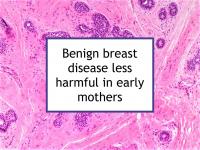A new study has reported that benign breast disease is less likely to progress to breast cancer in women who have children before age 25 and who have several children. The study included 1,357 women biopsied for benign breast disease: 661 cases (subsequently developed breast cancer) and 696 controls (did not develop breast cancer).
Controls were individually matched to cases based on treatment center, age at diagnosis, and follow-up period. Number of pregnancies, age at first live birth, and postmenopausal status were all found to be associated with lower risk of breast cancer. The risk of breast cancer among women who first gave birth before age 25 and who had at least three pregnancies was approximately half of that of women who had never given birth. The risk of breast cancer for postmenopausal women with benign breast disease was approximately 60% relative to premenopausal women.
Other factors associated with benign breast disease
The study makes clear that the changes that place during pregnancy (and, presumably, nursing) are particularly beneficial for young women with benign breast disease in reducing their risk of breast cancer. However, there are other factors that women with benign breast disease can also take into account in attempting to reduce their risk:
- Women with proliferative lesions, especially those with atypia, are much more likely to develop breast cancer than women with non-proliferative lesions. Women with fibroadenoma are less likely to progress to breast cancer than those without fibroadenoma
- Women with multiple benign breast lesions are at higher risk for progression to breast cancer than those with one lesion, according to one study. The majority of women with benign breast disease have more than one lesion (almost 70% of women with benign breast disease by one estimate). Concurrent multiple lesions may be associated with progression to breast cancer even among those with nonproliferative lesions or without atypia
- Women with high intake of omega-3 fatty acids were found to be less likely to have nonproliferative fibrocystic breast disease alone or with breast cancer in one study. The omega-6 fatty acid gamma-linolenic acid (corn oil, safflower oil, soybean oil, sunflower oil) was found to be positively associated with all fibrocystic and cancerous conditions. Another study found that a high omega-3/omega-6 fatty acid ratio was protective against progression to breast cancer
- While there appears to be no overall association between caffeine (coffee, black tea) consumption and breast cancer risk, there is some indication that they may increase risk in women with benign breast disease for tumors that are estrogen and progesterone receptor negative (ER-/PR-) or larger than 2 cm
- Heavy alcohol consumption in combination with benign breast disease was found to double the risk of breast cancer among postmenopausal women compared to nondrinkers without benign breast disease in one study
- Use of hormone replacement therapy (HRT) increases the rate of atypical ductal hyperplasia, which is associated with significantly increased breast cancer risk
- Several studies have failed to find a link between vitamin D intake and risk of benign proliferative breast disease or risk of progression to breast cancer.
Based on the available evidence, women with benign breast disease may be in a position to reduce their risk of breast cancer by increasing their intake of fatty fish and other sources of omega-3 fatty acids while limiting consumption of high omega-6 vegetable oils, caffeine, and alcohol. Hormone replacement therapy should be avoided.
